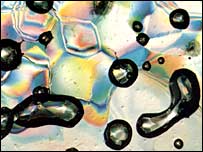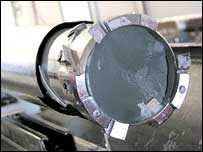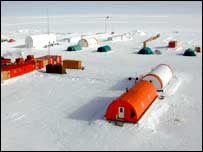CO2 'highest for 650,000 years'
|
By Richard Black
Environment Correspondent, BBC News website |

Gas bubbles trapped in ice store valuable climatic information
|
That is the conclusion of new European studies looking at ice taken from 3km below the surface of Antarctica.
The scientists say their research shows present day warming to be exceptional.
Other research, also published in the journal Science, suggests that sea levels may be rising twice as fast now as in previous centuries.
Treasure dome
The evidence on atmospheric concentrations comes from an Antarctic region called Dome Concordia (Dome C).

Epica drills have extracted ice from 3km under the Antarctic surface
|
Gas bubbles trapped as the ice formed yield important evidence of the mixture of gases present in the atmosphere at that time, and of temperature.
"One of the most important things is we can put current levels of carbon dioxide and methane into a long-term context," said project leader Thomas Stocker from the University of Bern, Switzerland.
"We find that CO2 is about 30% higher than at any time, and methane 130% higher than at any time; and the rates of increase are absolutely exceptional: for CO2, 200 times faster than at any time in the last 650,000 years."
Stable relationship
Last year, the Epica team released its first data. The latest two papers analyse gas composition and temperature dating back 650,000 years.
This extends the picture drawn by another Antarctic ice core taken near Lake Vostok which looked 440,000 years into the past.
The extra data is crucial because around 420,000 years there appears to have been a significant shift in the Earth's long-term climate patterns.
Before and after this date, the planet went through 100,000 year cycles of alternating cold glacial and warm interglacial periods.

The base at Dome Concordia
|
The Dome C core gives data from six cycles of glaciation and warming; two from before this change, four from after.
"We found a very tight relationship between CO2 and temperature even before 420,000 years," said Professor Stocker.
"The fact that the relationship holds across the transition between climatic regimes is a very strong indication of the important role of CO2 in climate regulation."
Epica scientists will now try to extend their analysis further back in time.
Water rise
Another study reported in the same journal claims that for the last 150 years, sea levels have been rising twice as fast as in previous centuries.
Using data from tidal gauges and reviewing findings from many previous studies, US researchers have constructed a new sea level record covering the last 100 million years.
They calculate the present rate of rise at 2mm per year.
"The main thing that's changed since the 19th Century and the beginning of modern observation has been the widespread increase in fossil fuel use and more greenhouse gases," said Kenneth Miller from Rutgers University.
The Intergovernmental Panel on Climate Change, the body which collates scientific evidence for policymakers, concludes that sea level rose by 1-2mm per year over the last century, and will rise by a total of anything up to 88cm during the course of this century.
![]() To
subscribe or visit go to: www.bbc.co.uk
To
subscribe or visit go to: www.bbc.co.uk